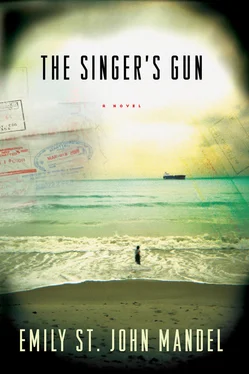Anton couldn’t find any English-language books in Sant’Angelo, which was at first an annoyance and then a genuine problem. He’d been reading two or three books at a time for his entire life, and he was unsure what to do with himself in the vacuum. He made inquiries here and there — a waiter at his favorite café in the piazza, the woman who ran the newsstand, a girl who spoke English in a clothing store by the harbor — and they all told him the same thing: the closest English-language books were in Napoli. At the end of the sixth week of waiting he took the bus back to Ischia Porto and boarded a ferry to Naples, blue Tyrrhenian, drinking a cappuccino on deck as he watched the city approach. It’s a civilized country that sells cappuccinos on the commuter ferries, Anton thought, and an affection for the place swelled inside him like music.
For almost the first time he began thinking of later, of after the transaction, of a job somewhere and an apartment in Sant’Angelo, or perhaps just a rented room. Napoli sprawled bright on the hills over the harbor. He made his way inland in stages, basking in the exuberance of being off Ischia — an hour in a café reading a newspaper, time spent browsing in innumerable little shops, a long interval on a bench in an ancient piazza with dread-locked university students playing drums nearby, seagulls sidling up to the café tables. There were two blissful hours in a bookstore near the university; Anton emerged near sunset with a hundred euros’ worth of fiction in a heavy paper bag. No reason to go back to Ischia just yet. The ferry ran late.
He stopped for pizza at a brightly painted little place near the water. Sometime past nightfall he climbed a flight of stairs up to the elegant sweep of Corso Vittorio Emanuele, the lights of boats in the Bay of Naples glimmering far below and Mount Vesuvius a blunt shadow against the southern sky. He looked up at the Hotel Britannique, at the balcony six floors up where in a previous lifetime he’d turned away from the lights of boats and islands and watched Sophie emerge from the shower. He was thinking about the night they’d arrived in Naples, the way the city had seemed an undifferentiated chaos of gray buildings and broken plaster and lights spreading up over the hillside, Sophie’s blue linen dress, the singer in the restaurant. He glanced at his watch and decided he had more than enough time for a drink before the last ferry to Ischia.
It took Anton some time to reach the restaurant where he’d dined with Sophie. When he stepped through the door the girl who had been singing that night was onstage again, midsong, and the déjà vu was startling. She wore the same dress as before, tight silver, and she was singing in the same languorous style but something was wrong with the microphone; her voice had a wavery, underwater quality, and it was difficult to make out the words. The restaurant was nearly empty.
Anton took a stool at the bar. The bartender brought the wrong drink. A brief argument ensued. His scotch was set down on the countertop with somewhat more force than was strictly necessary and it didn’t taste quite right, but he sipped it anyway and turned in his stool to look at the stage. The girl was singing a song he’d never heard before.
“What’s her name?” he asked the bartender. “Uh, the girl, the singer, sua nome? Parla inglese?” The bartender ignored him. The girl was leaving the stage. It wasn’t her night, or perhaps the sound quality was to blame. The applause was merely polite. Anton paid quickly and left the restaurant. The night air was cool. The stars were blacked out over the sea, a bank of clouds moving in from the distance. He found the side entrance and waited there, pacing, until the door opened and the girl came out.
“Excuse me,” he said.
She drew her breath in sharply and reached into her handbag.
“Wait,” he said, “I’m sorry, please don’t pepper-spray me, I didn’t mean to scare you. I just enjoyed your performance, I don’t know anyone here and I wondered if I could buy you a drink. That’s all.”
She considered him for a moment. Up close she was wearing too much makeup.
“I wasn’t going to pepper-spray you,” she said. She removed her hand from her bag. He would have guessed her to be somewhere in her early to midtwenties, but she had a voice like a twelve-year-old with an indefinable accent. “Just a drink?”
“Just a drink,” he said. “No strings. I just want to talk with someone who speaks English for a while. We’ll talk about the weather if you’d like.”
“That’s sweet of you. I know a place near here.”
“I’m Gabriel,” he said. “Gabriel Jones.”
She smiled, and the hand she extended was so warm that he wondered if she had a fever. “Arabelle,” she said.
“Arabelle? That’s a beautiful name.”
“Isn’t it?” She sounded pleased. “I made it up just now. Here, it’s further up the street.” She was leading him away from the sea, farther around the endless curve of CorsoVittorio Emanuele. They walked for a few minutes in silence, an arm’s length away from the street’s murderous traffic.
“What’s your real name, if you don’t mind me asking?”
“Kara,” she said.
“Where are you from?”
“Saskatchewan.”
“Saskatchewan?”
“Here we are,” she said. And he followed her into a low-lit room, a new-looking place with a red-tiled floor and candles flickering. The tables were unoccupied. A lone bartender was polishing glasses behind the empty bar, and there were faint notes of paint and varnish in the air.
“This is a nice place,” he said. She didn’t answer. She was leaning over the counter to greet the bartender, who kissed her on the cheek and said, “Ciao, Kyla.” Anton pulled back a barstool for her. Her skirt rode up above her thighs as she climbed onto the bar-stool. Anton looked away and caught the bartender’s eye. There was something in the man’s amused expression that he didn’t entirely like.
“Kyla,” Anton said, “not Kara?”
“It’s Kyra, actually,” she said, and ordered a drink in Italian. “No one can pronounce it here.”
“Due, per favore,” he said to the bartender, who nodded and turned away. “What did I just order?”
“You’ll like it. It’s grapey.”
“Excellent,” he said. But the drinks were the color of ultraviolet light and they tasted like sugar and lighter fluid; he swallowed his first sip with difficulty and set the glass down on the bar.
“It’s a grape martini,” she said. “I think they invented it here. Isn’t it something?”
“It’s certainly something, but I’m not sure it’s a martini. Listen,” Anton said, “don’t be offended, but I’m going to ask you your name one more time. Just for fun.”
“My name’s Carrie,” she said.
“Short for Kara?”
She shook her head. She was wide-eyed, biting her lip like a little girl trying not to laugh before the punch line.
“So your name’s changed. Are you still from Saskatchewan?”
“I’m from Albuquerque.” She stared at him for a moment longer and then burst into laughter. Her laugh was high-pitched, silvery, with a hysterical edge that made him shiver.
“Who are you?”
“Oh, come on,” she said, “don’t go all serious on me.”
“Why won’t you tell me your name?”
“Because everyone wants something. Your name, or a kiss, or your body, or whatever. Haven’t you ever just wanted to disappear?”
“I have,” Anton said. “I’m sorry. I understand now.”
“Can I have another grape martini?”
“Can you at least tell me what country you’re from?”
She hesitated.
“Just the name of your country. Your country for a drink.”
Читать дальше





![Ричард Деминг - Whistle Past the Graveyard [= Give the Girl a Gun]](/books/412176/richard-deming-whistle-past-the-graveyard-give-t-thumb.webp)






